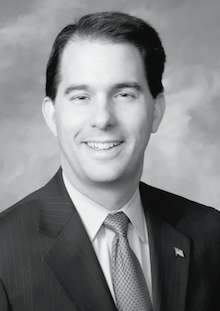January 9, 2015

Scott Walker
For the second time, Scott Walker held up his right hand, pledged to perform his duty as governor, and stepped into another four-year term as Wisconsin’s political leader. At his inauguration on Tuesday, the governor made a lot of promises to Wisconsinites. If those promises are kept, citizens can expect reforms in government spending, improvements to public education, and lower unemployment rates.
Where does all of that put Wisconsin minorities for the next four years?
For starters, Walker plans to make education and job training more accessible to any Wisconsinite seeking one.
“Here, our opportunities should be as equal as possible,” Walker said in the Capitol building after being sworn in late Tuesday morning. “But the outcomes, well, those outcomes should still be up to each and every one of us,” Supplementary state funding for public schools could help to fulfill that claim. The 2014-2015 state budget allocates an additional $322 million dollars to public education. This could prove especially helpful to Milwaukee schools in desperate need of new technology, teachers, and other amenities.
As far as employment, that’s still one of the governor’s first priorities. He plans to continue to lower an already depreciating unemployment rate. During his inaugural speech, however, Walker made it clear that he intends to use education as a stepping stone to better paying jobs — for those who want them, of course.
“In Wisconsin, we understand the best way to improve lives and strengthen families, as well as raise wages, is to assist people to get a better education and to acquire more skills.
This is how we grow household incomes, while putting people to work,” Walker said during his inaugural speech.
Low-income workers shouldn’t expect much as far as a minimum wage increase, however. Throughout his 2014 gubernatorial campaign, Walker expressed disinterest in requiring that the state have a set minimum wage.
During his second debate against Democratic candidate, Mary Burke, he offered that minimum wage isn’t all that helpful in ensuring sure that Wisconsinites are making the money they want to.
“I want jobs that pay two or three times the minimum wage,” said Walker when asked if he thought minimum wage was enough to live on.
To the governor, minimum wage isn’t something to dwell on. He’d like to focus on jobs that could pay far above the current $7.25, rather than buffer jobs he appears to see as somewhat transitive positions. At the debate, he mentioned his first job at McDonald’s, one that he didn’t intend on working at forever. However, this metaphor doesn’t account for those, especially Wisconsin minorities, whose minimum wage jobs could be a main source of income.
So although the minimum wage could stay rather static for a while, diverse college students might soon catch a financial break.
In 2013, Walker instituted a tuition freeze that prevented Wisconsin universities from increasing the cost of a college education. However, that freeze will only last until 2015.
This past April, the governor promised to make efforts to extend the freeze for another two years. If Walker delivers, some students might not see a single tuition increase throughout their entire college tenures. This could be of great benefit to minority students coming from low-income households who may be paying their own tuitions out of pocket or with large federal or private loans.
Walker’s promises may leave something to be desired for diverse Wisconsinites in the way of safety — especially in light of recent police brutality controversies — transportation, and healthcare. Nevertheless, the freshly appointed governor still has some valuable legislation on his docket. In the following months, we will see which of his promises are fulfilled, if not all.

